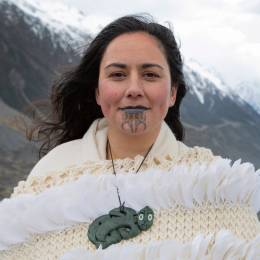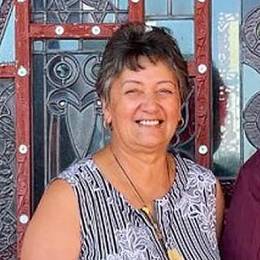
Contributors
-

Paraone Gloyne
Kaiwhakamāori -

Corin Merrick
Kaiwhakamāori -

Ariana Stevens
Kaiwhakamāori -

Donovan Te Ahunui Farnham
Kaiwhakamāori -

Wawaro Te Whaiti
Kaiwhakamāori -

Herea Winitana
Kaiwhakamāori -

Thomas Parata
Kaiwhakamāori -

Mākoha Gardiner
KaiwhakamāoriKanohi hōmiromiro -

Paiheretia Aperahama
Kaiwhakamāori -

Ruth Smith
Kaiwhakamāori -
Hēmi Kelly
Kaiwhakamāori
Pounamu Pounamu Te reo Māori edition
E rima tekau tau ki muri, ka puta mai a ‘Pounamu Pounamu’ hei kai mā te ao pānui reo Pākehā. Ko te whakataunga a ngā mana mātauranga o Aotearoa o taua wā, he pukapuka tēnei mā ngā tamariki i ngā kura o te motu whānui.
Kua huri te ao, kua hipa te wā, ko tēnei a ‘Pounamu Pounamu’ e horahia nei hei hākari mā te kaipānui reo Māori, ko ia rā pea te mokopuna a te kaipānui reo Pākehā o mua.
Ka pēhea te kawe i te wairua o tēnei kohinga kōrero e rangiwhāwhā nei te pānuitia, kia rangona tonutia ai te kounga o te kupu Pākehā? Me kawe tonu i te pukuhohe o He Kēmu Kāri, i te ngau mamae o Tangi, i te hōhonu o te aroha o Te Tamaiti.
Kua whakautua taua karanga e nga kaiwhakawhiti reo Māori tekau mā tahi i noho rā hei pia i Te Panekiretanga o Te Reo Māori me ngā Kura Reo. He mea hōmiromiro ā rātou whakamāoritanga e te kāhui hihira, e Mākoha Gardiner rātou ko Pānia Papa, ko Hēni Jacob, ko Stephanie Tibble. Kei roto nei ngā hua o tā ngā kāhui nei whakaheke tōtā, e kitea ai, e rangona ai hoki te puāwaitanga o te reo Māori me ngā reo ā-iwi i roto i ngā tau.
Kai te tū rangatira tonu ngā kupu i rere mai ai i te pene a Witi Ihimaera, nāna te huarahi i para hei whai mā te kaituhii kaupapa Māori. Me mihi, ka tika.
Ko Kotahi Rau Pukapuka te waka. Ko te pae tawhiti, kia 100 ngā pukapuka reo Māori ka pae ki uta. Ko te whāinga, kia puāwai te aroha ki te reo mā te rau pukapuka. Tēnei mātou e pōhiri ana i a Penguin Random House hei hoa whakatere, hei hoa whakatutuki i ngā wawata o te hunga e ngākaunui ana ki te reo Māori.
Fifty years ago, Pounamu Pounamu was published in English to widespread acclaim.
Education Department officials at the time praised the book and considered it fitting for students throughout the country. Time has passed and in this new era, a generation of readers of te reo Māori can now relish the stories within this classic collection.
The challenge for the translator lies in capturing the essence of the original English narrative. How to relay the humour of A Game of Cards, the grief inherent in Tangi, the depth of love conveyed in The Child?
Eleven translators, graduates of The Institute of Excellence in the Māori Language and national Kura Reo, have skillfully answered the call. Their translations were edited by a team comprising language experts Mākoha Gardiner, Pānia Papa, Hēni Jacob and Stephanie Tibble. The results of their combined efforts are an eloquent example of Māori language revitalisation and the resurgence of tribal dialects.The words which flowed from Witi Ihimaera’s pen have retained their power and significance, a beacon for the kaupapa Māori writers who were steered by its light. Witi’s precedent must be honoured.
“I am totally blown away by their skill,” Witi says. “To be frank, all the words are theirs, not mine. My te reo reading knowledge is limited but even I can see that the nuance of kupu, the rhythmic nature of the sentence-making and the resonance with underlying pūrākau make for a new reading experience. A new book entirely, one that steps out and shows why we should be a bilingual country.”
Kotahi Rau Pukapuka Trust has as its guiding mission to produce 100 quality reo Māori books to grow a love of the language. The Trust acknowledges Penguin Random House NZ, our fellow travellers in this quest to fulfill the aspirations of Māori language enthusiasts.
About Witi Ihimaera
 Three-time winner of the Wattie/Montana Book of the Year award, Katherine Mansfield fellow and playwright Witi Ihimaera is one of New Zealand’s most prolific and accomplished writers. Witi’s first novel, Tangi, won the Wattie Book of the Year Award in 1974, a feat he repeated with The Matriarch in 1986. His celebrated novel Bulibasha, King of the Gypsies, adapted as the film Mahana, won the Montana Book of the Year award in 1995.
Three-time winner of the Wattie/Montana Book of the Year award, Katherine Mansfield fellow and playwright Witi Ihimaera is one of New Zealand’s most prolific and accomplished writers. Witi’s first novel, Tangi, won the Wattie Book of the Year Award in 1974, a feat he repeated with The Matriarch in 1986. His celebrated novel Bulibasha, King of the Gypsies, adapted as the film Mahana, won the Montana Book of the Year award in 1995.
Witi’s other novels and short story collections include The Whale Rider (also adapted as an internationally successful film); Dream Swimmer (sequel to the award-winning The Matriarch); Pounamu Pounamu and Nights in The Gardens of Spain. In 2015 and 2019, he published the first two volumes of his autobiography, Māori Boy and Native Son; in 2020, a landmark book of Māori mythology, Navigating the Stars, and in 2022, a children’s book about Matariki in English (The Astromancer) and te reo (Te Kōkōrangi).
Contributors
-

Paraone Gloyne
Kaiwhakamāori -

Corin Merrick
Kaiwhakamāori -

Ariana Stevens
Kaiwhakamāori -

Donovan Te Ahunui Farnham
Kaiwhakamāori -

Wawaro Te Whaiti
Kaiwhakamāori -

Herea Winitana
Kaiwhakamāori -

Thomas Parata
Kaiwhakamāori -

Mākoha Gardiner
KaiwhakamāoriKanohi hōmiromiro -

Paiheretia Aperahama
Kaiwhakamāori -

Ruth Smith
Kaiwhakamāori -
Hēmi Kelly
Kaiwhakamāori
E wātea ana kia hokona i ngā toa pukapuka puta noa i te motu Purchase online and in bookstores throughout the country
